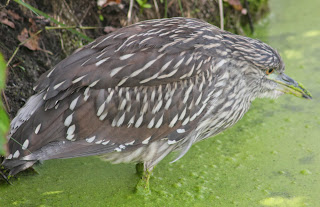On the elevated nature paths on the yellow trail, left of the hawk observation deck at Cape May Point State Park, I spotted an American Bittern, so I thought, ruffled and quiet. It was located down left of the bridge in the canal that proceeds on to Lighthouse Pond East and looked a bit pensive.
After getting some shots, I changed lenses, and aimed high to catch a juvenile Northern Harrier soaring by, with its dark head and "cinnamon-orange" body (Hawks in Flight by Dunne, Sibley, Sutton, p. 182). In each shot, it looks like its eyes are closed?
I then trained my lens back to the Bittern and so glad I did.
It had sprung to life and was hunting and then . .
was attacking something in the water!
After dunking it many times, I could make out that it was a hapless frog.
It then gulped it down and here, a leg is the last bit to be seen.
I hurried home and downloaded these pictures. I checked my Sibley Guide to Birds to be certain of my ID that I felt confident about and I found that actually this was not an American Bittern at all!!
The coloration is similar, but no bold stripes or long neck!
I flipped a few pages over and there it was.
It was a Juvenile Black-crowned Night-Heron.
Sibley's helpful progression was invaluable for the identification - the orange eye, the sharp yellowish bill, the large white spots on the wings, etc.
I was astonished of how much this bird changes from a juvenile to an adult.










That's an incredible transformation for a bird! Great picture sequence as well!!
ReplyDelete